英语国家社会与文化入门知识考点总结
英语国家社会与文化重点术语

英语国家社会与文化重点术语1. British Monarchy:英国君主制,指的是英国的君主制政府体制。
2. House of Commons:下议院,指的是英国主要立法机关之一,也是英国议会的两个部分之一。
3. House of Lords:上议院,指的是英国另外一个主要立法机关,也是英国议会的两个部分之一。
4. Prime Minister:首相,指的是英国执政党领导人,是英国内阁的首脑和政府的领导者。
5. Cabinet:内阁,指的是由首相挑选的政府部长组成的政府机构,决定英国政府的政策和行动。
6. Queen’s Speech:女王演讲,每年在英国的议会开幕时,由女王亲自发表的演讲。
7. Politics:政治,指的是社会维护社会稳定,调节社会关系,实现社会发展的活动过程。
8. Parliament:英国议会,是讨论和决定英国国家政策的高级立法机构,也是英国政府的最高权力机构。
9. Law:法律,规范国家内外秩序、保障国家和民族利益和权利的检测过程。
10. Constitution:宪法,是一国的政权体系以及公民权利和义务的根本法。
11. Human Rights:人权,指人们在代表国家的政府的保护下,享有的一系列的权利和自由。
12. Freedom of Expression:言论自由,指人民可以自由地表达自己的想法,不受任何形式压制。
13. National Identity:国家认同,指共同体中具有特定文化、语言、信仰等共同性的独特性,共同为国家特定历史、凝聚力和竞争力而努力。
14. Diversity:多样性,指的是不同文化、不同宗教、不同背景和不同选择等等,都在一起被尊重、受到容纳、并互相影响。
15. Multiculturalism:多元文化,指的是一个社会中的多种文化,有存在的多样性的社会。
16. Immigration:移民,指的是一个国家的人口在短时间内有显著的增长,或者将永久定居于其他国家的行为。
朱永涛《英语国家社会与文化入门》...

朱永涛《英语国家社会与⽂化⼊门》...第3章美国的起始I.Decide whether the following statements are true(T)or false(F):1.The question“What is an American?”was first asked by J.Hector St.John de Crevecoeur. _____【答案】T【解析】什么样的⼈叫美国⼈?这⼀经典的问题是由法国农⼈赫克托.圣约翰·德克雷夫科尔在他的《美国农⼈书简》⼀书中提出来的。
因此此题正确。
2.Christopher Columbus discovered America in1492._____【答案】T【解析】克⾥斯托弗·哥伦布是西班⽛著名航海家,于1492年第⼀个发现美洲⼤陆。
因此此题正确。
3.The first English permanent settlement was founded in California._____【答案】F【解析】1607年,英国有3艘船只⾏驶到北美,殖民者史密斯等在弗吉尼亚亨利⾓登陆,并定居下来。
因此此题错误。
4.Massachusetts was established by English puritans who separated themselves from the Roman Catholic Church._____【答案】F【解析】这批出逃的清教徒并⾮是从罗马天主教反叛⽽出,⽽是从英国国教中反叛⽽出。
因此此题错误。
5.The state of Pennsylvania used to be inhabited by the Quakers._____【答案】T【解析】宾⼣法尼亚州曾属于威廉佩恩。
⽽他本⼈则信仰贵格派,他决定按照贵格会的理想,建⽴⼀个宗教信仰和政治⾃由的地⽅。
因此宾州是美国第⼀个宗教信仰⾃由的地⽅。
朱永涛《英语国家社会与文化入门》笔记和考研真题详解(加拿大的国际关系)【圣才出品】
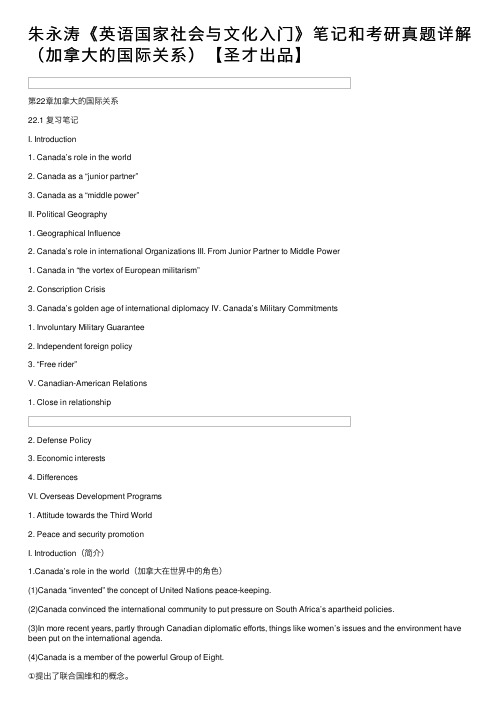
朱永涛《英语国家社会与⽂化⼊门》笔记和考研真题详解(加拿⼤的国际关系)【圣才出品】第22章加拿⼤的国际关系22.1 复习笔记I. Introduction1. Canada’s role in the world2. Canada as a “junior partner”3. Canada as a “middle power”II. Political Geography1. Geographical Influence2. Canada’s role in international Organizations III. From Junior Partner to Middle Power1. Canada in “the vortex of European militarism”2. Conscription Crisis3. Canada’s golden age of international diplomacy IV. Canada’s Military Commitments1. Involuntary Military Guarantee2. Independent foreign policy3. “Free rider”V. Canadian-American Relations1. Close in relationship2. Defense Policy3. Economic interests4. DifferencesVI. Overseas Development Programs1. Attitude towards the Third World2. Peace and security promotionI. Introduction(简介)1.Canada’s role in the world(加拿⼤在世界中的⾓⾊)(1)Canada “invented” the concept of United Nations peace-keeping.(2)Canada convinced the international community to put pressure on South Africa’s apartheid policies.(3)In more recent years, partly through Canadian diplomatic efforts, things like women’s issues and the environment have been put on the international agenda.(4)Canada is a member of the powerful Group of Eight.①提出了联合国维和的概念。
英语国家社会与文化知识要点汇总
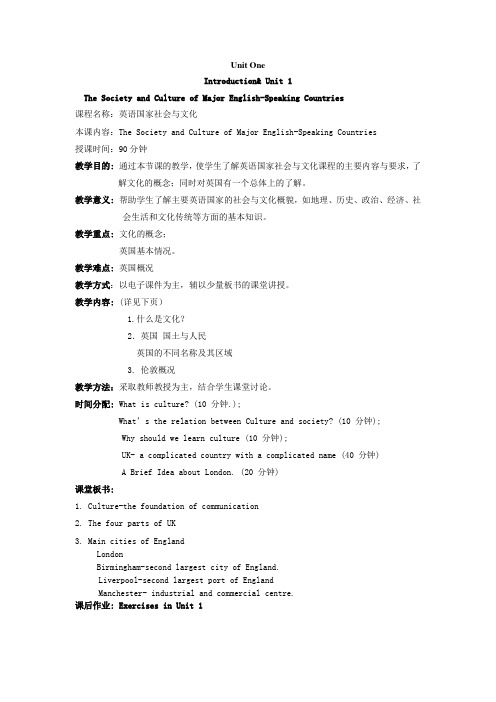
Unit OneIntroduction& Unit 1The Society and Culture of Major English-Speaking Countries课程名称:英语国家社会与文化本课内容:The Society and Culture of Major English-Speaking Countries授课时间:90分钟教学目的:通过本节课的教学,使学生了解英语国家社会与文化课程的主要内容与要求,了解文化的概念;同时对英国有一个总体上的了解。
教学意义:帮助学生了解主要英语国家的社会与文化概貌,如地理、历史、政治、经济、社会生活和文化传统等方面的基本知识。
教学重点:文化的概念;英国基本情况。
教学难点:英国概况教学方式:以电子课件为主,辅以少量板书的课堂讲授。
教学内容: (详见下页)1.什么是文化?2.英国国土与人民英国的不同名称及其区域3. 伦敦概况教学方法:采取教师教授为主,结合学生课堂讨论。
时间分配: What is culture? (10 分钟.);What’s th e relation between Culture and society? (10 分钟);Why should we learn culture (10 分钟);UK- a complicated country with a complicated name(40 分钟)A Brief Idea about London. (20 分钟)课堂板书:1. Culture-the foundation of communication2. The four parts of UK3. Main cities of EnglandLondonBirmingham-second largest city of England.Liverpool-second largest port of EnglandManchester- industrial and commercial centre.课后作业: Exercises in Unit 1Unit OnePart One1.What is culture?Culture-the foundation of communicationCulture is very abstract and complicated. Concretely speaking, it refers to all the aspects of social life, such as, the values, the practices of a society and social conventions, education, politics, art or literature,language,ideas,etc.文化即是人们所思,所言(言语和非言语),所为,所觉的总和.文化是无处不在的,具体说来,包括社会生活的一切方面,如:价值观念,生活行为方式,社会规范等,乃至艺术,政治,经济, 教育,修养,文学,语言,思想等.2. What’s the relation between Culture and society?1)Culture is a separate idea from society, although culture and society areinterrelated and cannot exist without each other.2)Culture is a system of values (or beliefs) and norms (or behaviour). A societyis a system of interrelationships which connect or bind individuals together.3. Why should we learn culture?1)Requirement of communication2) Language and culture are inseparable3)Culture acquisition is important for the study of literature.Part TwoUK- a complicated country with a complicated nameⅠStatus in the worldEffects of its Imperial Past--“an empire in which the sun never set”(日不落帝国):1.one of five permanent members of the UN Security Council, a founding memberof NATO, and of the Commonwealth,2. Member of European Union and the Group of seven3.The make-up of the British population (Immigration has produced a populationof which 1 in 20 are of non-European ethnicity.)II. The effects of its imperial past* The days of empire ended after World War II1. The effects were mainly encountered in the close relationships which exist with the 50 or more colonies of that empire, and which maintain links through Commonwealth of Nations. But more important international relation is its membership in the European Union since 1973.2. The makeup of the British population--- immigration from India, Pakistan, or Caribbean (西印度群岛与中南美洲海域) countries in the 1950s and1960s. 1/20 are non-European ethnicity.III.The features of British society:1.a multiracial societyRacial, gender, class, regional and economic differences in the societya multi-racial society: most are Christians and because of immigration, many are Muslims;gender difference: male and female live different livesclass difference: the class structure of UK society is relatively obvious (A white-collar worker’s lives are very different from a blue-collar worker’s.) economic and regional difference within each of the 4 countries:-- difference between highland and lowland Scots-- difference between north and south England (South is on average more wealthy than the north)2. a society with class-structure3. a society with difference of region difference: highland and lowland Scots,north and south England,the capital and provinces.Part ThreeMain cities of England1. London2. Birmingham-second largest city of England.3. Liverpool-second largest port of England4. Manchester- industrial and commercial centre.London--cultural,bussness,and financial centre1. One of the most famous cities of the world, London is England's capital and a favourite for tourists from all over the world who flock there in their millions. It has a history stretching back almost 2000 years, A population of 7.5 million people, and some of the most famous tourist attractions in the world.2.London Attractions:Big Ben and the Houses of Parliament.The Tower of London,Tower Bridge,St Paul's Cathedralthe River ThamesCountless fascinating museums, art galleries and famous theatres.The English Royal Family reside in London at Buckingham Palacewhere you can see the famous 'Changing of the Guard'and muchmore.3. A significant role of LondonWhen a man is tired of London, you are tired of life for there is in London all that life can afford.—Samuel Johnson London is dominant in UK in all sorts of ways.1)It is the largest city in the country with abo ut one seventh of the nation’spopulation.2)It is seat of government.3)It is the cultural centre.4)It is the business centre.5)It is the financial centre of the nation.6)London is a huge weight in Britain’s economic and cultural life, and to someextent the rest of the country lives in its shadow.For reference英国历代国王与王后Geographical features1.Geographical positionThe United Kingdom of Great Britain and Northern Ireland (UK) is situated north-west of the European continent between the Atlantic Ocean and the North Sea. It has a total land area of 244,100 square kilometres, of which nearly 99% is land and the remainder inland water. From north to south it is about 1,000 kilometres long.(1) Northwest of Europe(2) North Atlantic Ocean(3) Separated from the rest of Europe by the English Channel2.Geographical features(1) An island country, surrounded by sea(2) Highlands in the north and west(3) Lowlands in the east and southeastA. Part of the great European PlainB. Level land and fertile soilC. farming(4) 3 natural zones in ScotlandA. the highlands in the northB. the central lowlandsC. the southern uplands. Rivers and LakesImportant role of rivers in the country’s economy1.Important Rivers(1)the Severn RiverA.the longest in the countryB.only 338 kilos long(2)the Thames RiverA.the 2nd longestB.the most important riverC.336 kilos longD.Oxford and London are on the river(3)River ClydeA.the most important in ScotlandB.important commercial waterway2.the Lake District(1)in northwest England and North Wales(2)popular tourist attractions(3)the home of the Lake PoetsA.William WordsworthB.Samuel Taylor ColeridgeC.Robert SoutheyClimate1.Typical feature of Britain’s climate“Other countries have a climate; in England we have weather.”The statement is often made by Englishmen to describe the peculiar meteorological conditions of their country.A maritime type of climate(1)rainy---abundant rainfallThe uncertainty about the weather tends to make the Englishmen cautious.“A foreigner may laugh when he sees the Englishman setting forth on a brilliantly sunny morning wearing a raincoat and carrying an umbrella, but he may well regret his laughter later in the day!”(2)changeable and unpredictable, no clear cut of 4 seasons“In no country other than England, it has been said, can one experience four seasons in the course of a single day! Day may break as a balmy spring morning; an hour or so later black clouds may have appeared from nowhere and the rain may be pouring down. At midday conditions may be really wintry with the temperature down by about eight degrees or more centigrade. And then, in the late afternoon the sky will clear, the sun will begin to shine, and for an hour or two before darkness falls, it will be summer.”(3)Mild: no extremesIn England one can experience almost every kind of weather except the most extreme.temperature: 4-6℃ in winter, 12-17℃ in summer2.Factors influencing the climate(1)the surrounding waters(2)the prevailing south-west winds(3)the North Atlantic Drift (warm current)3.Rainfall(1) a steady reliable rainfall throughout the year(2)uneven distribution of rainA. a water surplus in the north and westB. a water deficit in the south and eastUnit TwoThe History of England课程名称:英语国家社会与文化本课内容:The Society and Culture of Major English-Speaking Countries授课时间:90分钟教学目的:通过本节课的教学,使学生了解英国历史,尤其是英格兰的历史;掌握主要历史事件及人物。
英语国家社会与文化重点术语

英语国家社会与文化重点术语
monwealth of Nations: 英联邦,包括英格兰,威尔士,苏
格兰,北爱尔兰和52个唯一的独立共和国或王国。
2.The United Kingdom: 英国,由英格兰,威尔士,苏格兰和北爱尔
兰组成。
3.British Isles: 不列颠群岛,由英国,爱尔兰,苏格兰,威尔士和
英格兰大部分其他岛屿组成。
4.English language: 英语,它是英国最主要的语言,在英联邦和其
他英语国家有广泛使用。
5.English literature : 英语文学,指的是用英语撰写的文学作品,
起源于英国,并被全世界传播。
6.British monarchy: 英国君主制,也称英国王室,是以女王或国王
为头的君主制,历史悠久。
7.British culture: 英国文化,指的是由英国及其前殖民地创造的文化,包括文学,艺术,表演艺术,音乐,电影,体育,宗教,历史,
建筑和社会习俗等。
8.British accent: 英国口音,指用英语讲话时,英国人所使用的口音,有不同的地区口音。
9.British cuisine: 英国菜肴,指由英国的食品、烹饪方法和历史习
惯组成的料理,融合欧洲,北美洲,中东和亚洲元素。
10.United Kingdom flag: 标志联合王国的国旗,也称为Union Jack,由英格兰,威尔士和苏格兰三块组成。
英语国家社会文化知识
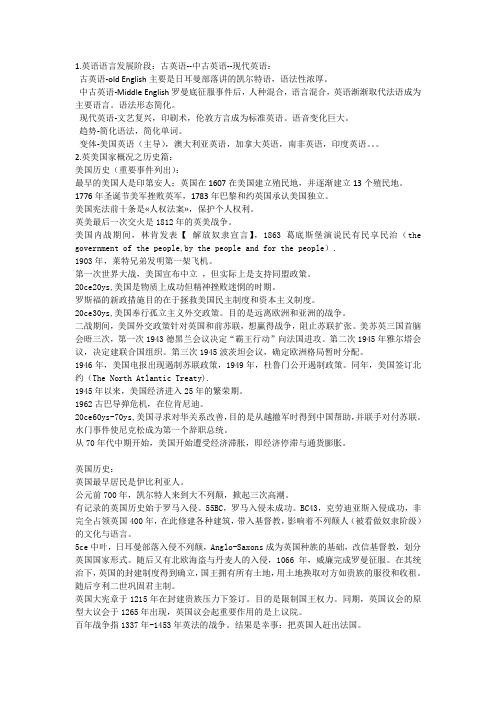
1.英语语言发展阶段:古英语--中古英语--现代英语:古英语-old English主要是日耳曼部落讲的凯尔特语,语法性浓厚。
中古英语-Middle English罗曼底征服事件后,人种混合,语言混合,英语渐渐取代法语成为主要语言。
语法形态简化。
现代英语-文艺复兴,印刷术,伦敦方言成为标准英语。
语音变化巨大。
趋势-简化语法,简化单词。
变体-美国英语(主导),澳大利亚英语,加拿大英语,南非英语,印度英语。
2.英美国家概况之历史篇:美国历史(重要事件列出):最早的美国人是印第安人;英国在1607在美国建立殖民地,并逐渐建立13个殖民地。
1776年圣诞节美军挫败英军,1783年巴黎和约英国承认美国独立。
美国宪法前十条是«人权法案»,保护个人权利。
英美最后一次交火是1812年的英美战争。
美国内战期间,林肯发表【解放奴隶宣言】,1863葛底斯堡演说民有民享民治(the government of the people,by the people and for the people).1903年,莱特兄弟发明第一架飞机。
第一次世界大战,美国宣布中立,但实际上是支持同盟政策。
20ce20ys,美国是物质上成功但精神挫败迷惘的时期。
罗斯福的新政措施目的在于拯救美国民主制度和资本主义制度。
20ce30ys,美国奉行孤立主义外交政策。
目的是远离欧洲和亚洲的战争。
二战期间,美国外交政策针对英国和前苏联,想赢得战争,阻止苏联扩张。
美苏英三国首脑会晤三次,第一次1943德黑兰会议决定“霸王行动”向法国进攻。
第二次1945年雅尔塔会议,决定建联合国组织。
第三次1945波茨坦会议,确定欧洲格局暂时分配。
1946年,美国电报出现遏制苏联政策,1949年,杜鲁门公开遏制政策。
同年,美国签订北约(The North Atlantic Treaty).1945年以来,美国经济进入25年的繁荣期。
1962古巴导弹危机,在位肯尼迪。
初中阶段的英语国家和文化英语知识点
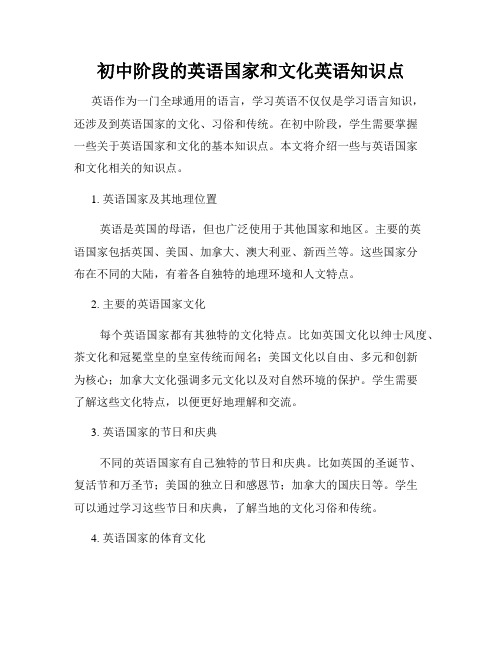
初中阶段的英语国家和文化英语知识点英语作为一门全球通用的语言,学习英语不仅仅是学习语言知识,还涉及到英语国家的文化、习俗和传统。
在初中阶段,学生需要掌握一些关于英语国家和文化的基本知识点。
本文将介绍一些与英语国家和文化相关的知识点。
1. 英语国家及其地理位置英语是英国的母语,但也广泛使用于其他国家和地区。
主要的英语国家包括英国、美国、加拿大、澳大利亚、新西兰等。
这些国家分布在不同的大陆,有着各自独特的地理环境和人文特点。
2. 主要的英语国家文化每个英语国家都有其独特的文化特点。
比如英国文化以绅士风度、茶文化和冠冕堂皇的皇室传统而闻名;美国文化以自由、多元和创新为核心;加拿大文化强调多元文化以及对自然环境的保护。
学生需要了解这些文化特点,以便更好地理解和交流。
3. 英语国家的节日和庆典不同的英语国家有自己独特的节日和庆典。
比如英国的圣诞节、复活节和万圣节;美国的独立日和感恩节;加拿大的国庆日等。
学生可以通过学习这些节日和庆典,了解当地的文化习俗和传统。
4. 英语国家的体育文化体育在英语国家有着重要的地位,不同的体育项目也与当地文化紧密相连。
例如英式足球在英国是最受欢迎的运动,美国橄榄球和篮球在美国备受热爱,加拿大的冰球是国球。
了解英语国家的体育文化,对于拓宽学生的视野和培养体育兴趣都有益处。
5. 英语国家的饮食文化饮食文化也是了解一个国家的重要方面。
英语国家的饮食文化多种多样,比如英国的英式早餐、美国的汉堡和炸鸡、加拿大的枫糖浆等。
学生可以通过学习英语国家的饮食文化,了解不同国家的饮食习俗和传统。
6. 英语国家的名人和文化艺术英语国家涌现了众多的名人和文化艺术家。
通过了解一些英语国家的重要名人和文化艺术作品,学生可以进一步了解英语国家的历史和文化成就。
比如英国的莎士比亚、美国的爱默生和卡莱尔、加拿大的贝鲁特等。
7. 英语国家的教育体系英语国家的教育体系对于学生的成长和未来发展起到重要的影响。
了解英语国家的教育体系,可以帮助学生更好地规划自己的学习和职业发展。
英国社会文化考研朱永涛《英语国家社会文化入门》复习笔记
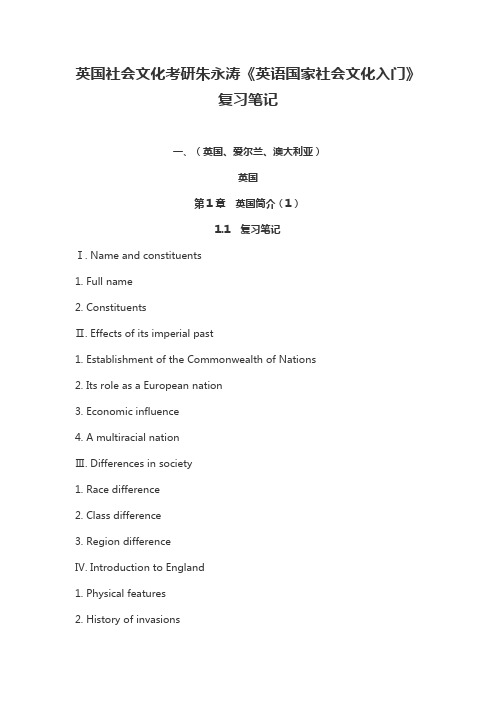
英国社会文化考研朱永涛《英语国家社会文化入门》复习笔记一、(英国、爱尔兰、澳大利亚)英国第1章英国简介(1)1.1 复习笔记Ⅰ. Name and constituents1. Full name2. ConstituentsⅡ. Effects of its imperial past1. Establishment of the Commonwealth of Nations2. Its role as a European nation3. Economic influence4. A multiracial nationⅢ. Differences in society1. Race difference2. Class difference3. Region differenceⅣ. Introduction to England1. Physical features2. History of invasionsⅤ. Introduction to Scotland1. Physical features2. History3. Retaining strong Scottish identityⅥ. Introduction to Wales1. Physical features2. A history features campaigns for independence from UKI. Name and constituents(全称和组成)1. Full name(全称)The United Kingdom of Great Britain and Northern Ireland大不列颠及北爱尔兰联合王国2. Constituents(组成部分)(1)The island of Great Britain: England, Scotland and Wales(2)Northern Ireland(1)大不列颠岛:英格兰、苏格兰和威尔士(2)北爱尔兰Ⅱ. Effects of its imperial past(殖民时期的影响)1. Establishment of the Commonwealth of Nations(促成英联邦的成立)The Commonwealth of Nations is a loose and voluntary organization with members mainly being former colonies of the British Empire.英联邦是一个以自愿加入为基础的组织,成员国多为前大英帝国殖民地。
英语国家社会与文化入门期末考试复习资料

英语国家社会与文化入门期末考试复习资料III. Acronyms1. GCSE: General Certificate of Secondary Education(普通中等教育证书)2. the BBC: the British Broadcasting Corporation(英国广播公司)3. WASP: White Anglo-Saxon Protestant(盎格鲁-撒克逊白人新教)4. NATO: North Atlantic Treaty Organisation(北大西洋公约组织)V. Term Differentiating1. The Anglo-Saxons: They were two groups of Germanic peoples who settleddown in England from the 5th century. They were regarded as the ancestors of the English and the founders of England.2. Class System(U.K.): The class system does exist in British society. Most of theBritish population would claim themselves to be either of middle-class or working-class, though some people would actually belong to the upper middle-class or lower middle-class. Class divisions are not simply economic, they are cultural as well. People of different classes may differ in the kind of newspapers they read, in the way they speak and in the kind of education they receive. One of the distinctive features about the British class system is that aristocratic titles can still be inherited.3. Grammar Schools: It is a type of secondary schools in Britain. Grammar schoolsselect children at the age of 11, through an examination calle d “the 11-plus”.Those children with the highest marks go to grammar schools. These schools lay emphasis on advanced academic subjects rather than the more general curriculum of the comprehensive schools and expect many of their pupils to go on to universities.4. The Commonwealth: The Commonwealth is a voluntary association of stateswhich is made up of Britain and mostly of former British colonies. There are 54 members of the Commonwealth including one currently suspended member: many of these are developing countries like India and Cyprus; others are developed nations like Australia, Canada and New Zealand. The Commonwealth was set up as a forum for continued cooperation and as a sort of support network.5. Tabloids: A tabloid is a small format newspaper with colour photos and catchyheadlines. Tabloids are interested in scandals and gossip usually about famous people. They also carry lots of crime, sports and sentional human interest stories so as to attract readers. Stories are short, easy to read often rely more on opinions than fact. They belong to a category of national papers different from quality papers.6. Puritanism: Puritans were those who followed the doctrinee of John Calvin and wanted to purify the Church of England. They believe that human beings were predestined by God before t hey were born. Some were God’s chosen people while others were damned to hell. No church nor good works could save people. The sign of being God’s elect was the success in his work or the prosperity in his calling. They also argued that everyone must read the Bible in order to find God’swill and establish a direct contact with God. These beliefs had great impact on American culture.7. Bill of Rights(Amendments): The Bill of Rights consists of the first 10 amendments which were added to the Constitution in 1791. The Bill of Rights was passed to guarantee freedom and individual rights such as freedom of speech, the right to assemble in public places, the right to own weapons and so on.8. The Three Faiths: By the 1950s, the three faiths model of American religion had developed. Americans were considered to come in three basic varieties: Protestant, Catholic and Jewish. In terms of numbers, the Protestants are the strongest, the Catholics are next to the Protestants and Jewish are the smallest among the three groups.VI. Q&A(references)1. The influence of the foreign invasions of Britain on the development of theEnglish language:A: (1)During the 5th Century AD three Germanic tribes (Saxons, Angles, and Jutes) came to the British Isles from various parts of northwest Germany aswell as Denmark. Through the years, the Saxons, Angles and Jutes mixedtheir different Germanic dialects. This group of dialects forms whatlinguists refer to as Old English or Anglo-Saxon.(2)The arrival of St. Augustine in 597 and the introduction of Christianityinto Saxon England brought more Latin words into the English language.(3)Around 878 AD Danes and Norsemen, also called Vikings,invaded thecountry and English got many Norse words into the language, particularly in the north of England. The Vikings, being Scandinavian, spoke a language (Old Norse) which, in origin at least, was just as Germanic as Old English.(4)After William the Conqueror, the Duke of Normandy, invaded andconquered England in 1066 AD with his armies and became king, the Old French took over as the language of the court, administration, and culture.Latin was mostly used for written language, especially that of the Church.2. The influence of the Protestant Reformation on the formation of the UnitedStates(refer to your textbook on pages 37-38)。
英语国家社会与文化重点术语
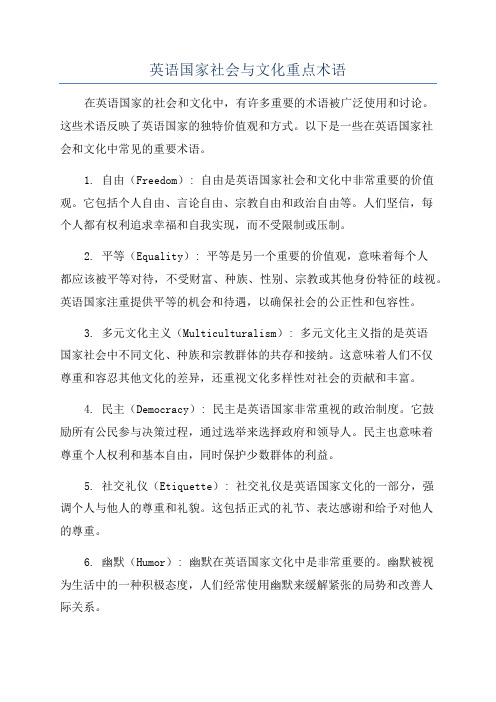
英语国家社会与文化重点术语在英语国家的社会和文化中,有许多重要的术语被广泛使用和讨论。
这些术语反映了英语国家的独特价值观和方式。
以下是一些在英语国家社会和文化中常见的重要术语。
1. 自由(Freedom): 自由是英语国家社会和文化中非常重要的价值观。
它包括个人自由、言论自由、宗教自由和政治自由等。
人们坚信,每个人都有权利追求幸福和自我实现,而不受限制或压制。
2. 平等(Equality): 平等是另一个重要的价值观,意味着每个人都应该被平等对待,不受财富、种族、性别、宗教或其他身份特征的歧视。
英语国家注重提供平等的机会和待遇,以确保社会的公正性和包容性。
3. 多元文化主义(Multiculturalism): 多元文化主义指的是英语国家社会中不同文化、种族和宗教群体的共存和接纳。
这意味着人们不仅尊重和容忍其他文化的差异,还重视文化多样性对社会的贡献和丰富。
4. 民主(Democracy): 民主是英语国家非常重视的政治制度。
它鼓励所有公民参与决策过程,通过选举来选择政府和领导人。
民主也意味着尊重个人权利和基本自由,同时保护少数群体的利益。
5. 社交礼仪(Etiquette): 社交礼仪是英语国家文化的一部分,强调个人与他人的尊重和礼貌。
这包括正式的礼节、表达感谢和给予对他人的尊重。
6. 幽默(Humor): 幽默在英语国家文化中是非常重要的。
幽默被视为生活中的一种积极态度,人们经常使用幽默来缓解紧张的局势和改善人际关系。
8. 教育(Education): 教育在英语国家非常重要,被认为是达到个人成功和社会发展的关键。
英语国家致力于提供高质量的教育,以便培养学生的技能和知识,并帮助他们实现自己的潜力。
9. 家庭(Family): 家庭是英语国家的核心,被视为最重要的社会单位。
家庭关系通常非常亲密,家庭成员之间的相互支持和彼此照顾被视为非常重要。
10. 慈善(Charity): 在英语国家,慈善事业是社会文化的重要组成部分。
英语国家社会与文化复习

术语翻译维多利亚女王Queen Victoria 伊丽莎白女王 Queen Elizabeth 迪斯尼乐园 Disneyland 天佑女王 God Save the Queen 君主立宪制 constitutional monarchy 星条旗 The Star-Spangled Banner 英国上议院 House of lords 英国下议院 House of commons 美国参议院 US House of Representatives 美国众议院 US Senate 嘉德勋章 The Most Noble Order of the Garter印度之星勋章 The Most Exalted Order of the Star of India执政党 Ruling party 反对党 Opposition Party影子内阁 Shadow Cabinet 国务卿 Secretary of State唐宁街 Downing Street 唐人街 Chinatown圣帕特里克 St. Patrick's Day 圣乔治 St George’s Day沙夫茨伯里大街 Shaftesbury avenue 圣安德鲁St Andrews自由女神 Statue of Liberty英国首相 Prime Minister, First Lord of the Treasury and Minister for the Civil Service西敏寺 Westminster Abbey 圣米迦勒 Michaelis天主教 Catholic Church 东正教 Orthodox Church清教 Puritan 新教 Protestantism杜莎夫人蜡像馆 Madame Tussaud's 圣公会 Anglican Church华尔街 Wall Street 百老汇 Broadway帝国大街 Britannia Street帝国大厦 The Empire state building2 伦敦电影节:London Film FestivalABC:American Broadcasting Company (美国广播公司)VOA:Voice of America(美国之音)CNN:Cable News Network(美国有线电视新闻网)英国首相:David William Donald Cameron(戴维·卡梅伦)副首相:Nick Clegg(尼克・克莱格)美国总统:贝拉克·奥巴马(Barack Obama)美国副总统:约瑟夫·拜登(Joseph Robinette)澳大利亚英国女王伊丽莎白二世(Her Majesty Queen Elizabeth II)总理:托尼·阿博特(Tony Abbott)加拿大:英国女王伊丽莎白二世(Her Majesty Queen Elizabeth II)加拿大总理:史蒂芬·哈珀(Stephen Harper)英国外交大臣:威廉·黑格(William Hague)美国外交部长及国务卿:约翰·福布斯·克里(John Forbes Kerry)澳大利亚外交部长:Julie Bishop (朱莉·毕晓普)加拿大现任外交官:罗伯特·道格拉斯·尼克尔森(Robert Douglas Nicholson)英美单词拼写差异:1,英语单词中不发音的词尾-me,-ue在美语拼写中被删除.英语拼法美语拼法公斤kilogramme——kilogram 方案programme——program目录catalogue——catalog 对话dialogue——dialog序言prologue——prolog 独白monologue——monolog类似的analogue——analog2,英语中的以-our结尾的单词,在美语中删去了不发音的字母u.英语拼法美语拼法举止、行为behaviour——behavior 颜色colour——color特别喜爱的favourite——favorite 风味flavour——flavor荣誉honour——onor 劳动labour——labor幽默humour——humor3,英语中以-re结尾,读音为/e/的单词,在美语中改为-er结尾,读音不变.英语拼法美语拼法中心centre——center 纤维fibre——fiber公尺metre——meter 剧场theatre——theater升litre——liter4,英语中某些以-ence为结尾的单词,在美语中改为-ense结尾,读音仍为/ns/.英语拼法美语拼法防御defence——defense 犯法行为offence——offense执照licence——license 托词pretence——pretense5英语中一些以-ise为结尾的单词,在美语中改为-ize结尾,读音仍这/z/.英语拼法美语拼法组织organise——organize, actualise——actualize实现realise——realize 创作improvise ——improvize专攻Specialise——specialize 现代化modernise——modern ize受欢迎 Popularise——popularize6一些以l结尾的单词变形时,美式不双写l;英式双写l旅游travelling——traveling 吵架quarrelling——quarreling英国大学四种种类:1、Ancient university Red brick university2、New university3、Modern university4、Open university英国中学的四种种类:私立学校(independent school)普通中学(comprehensive school)文法学校(grammar school)学院制中学(academy)三位一体教义:the union of three persons (Father, Son, and Holy Ghost) in one Godhead, or the threefold personality of the one Divine Being.星座:白羊座----Aries 金牛座----- Taurus 双子座----- Gemini 巨蟹座----Cancer 狮子座---- Leo 处女座----Virgo 天秤座-----Libra 天蝎座----Scorpio 射手座---- Sagittarius 山羊座---- Capricorn 水瓶座----- Aquarius双鱼座------Pisces生肖:1. Rat 鼠2. Ox 牛3. Tiger 虎4.Rabbit 兔5.Dragon 龙6.Serpent 蛇7.Horse 马8.Goat 羊9.Monkey 猴10.Rooster 鸡11.Dog 狗12. Swine 猪希腊罗马诸神:宙斯(Zeus) 天神赫拉(Hera) 天后雅典娜(Athena) 智慧女神,女战神阿波罗(Apollo) 太阳神潘(Pan) 山林之神维纳斯(Venus)萨坦Saturn 丘比特(Cupid)美国两大新闻社:美国联合通讯社The Associated Press (AP)合众国际社United Press-International(UPI)两大财团:摩根财团(Morgan Financial Group)第一花旗银行财团First Nation city bank Financial Group两大航空公司:美国航空(American Airlines)美国联合航空公司(United Airlines)1.贵族头衔公爵:duke 候爵:Marquis 伯爵:earl 子爵:viscount 男爵:baron 2.祝酒词Bottoms up 干杯!Prosit 祝妳健康!祝妳成功!Bon appetite 喫好!Sainte 干杯!Down the hatch! 干杯!3.英语期刊种类Sorts of periodicals 各种各样的期刊Commercial periodicals 商业期刊Catchall periodicals 包罗万象的期刊Technical periodicals 科技期刊Special periodicals 专业期刊Entertaining periodicals 娱乐性期刊4.莎士比亚作品Hamlet 哈姆雷特Romeo and Juliet罗密欧与朱丽叶As You Like It 皆大欢喜Much Ado about Nothing无事生非The Taming of the Shrew驯悍记5.狄更斯作品《荒凉山庄》Bleak House 《艰难时世》Hard Times《小杜丽》 Little Dorrit 《美国纪行》American Notes《圣诞颂歌》A Christmas Carol6.海明威作品《老人与海》The Old Man and the Sea 《岛在湾流中》Islands in the Stream《伊甸园》The Garden of Eden 《曙光示真》True At First Light《在我们的时代里》In Our Time7.英国酒吧的种类Public bar or pub 大众酒吧Saloon bar 雅座酒吧private bar 私人酒吧lounge bar 高級酒吧Beer garden 啤酒花園8.剧院的种类(3种)1 .State--owned theatres :Opera House National Theatre2. Commercial theatres :Theatre Piccadilly TheatreTheatre3.Experimental theatres4.2英国美国电影分级:美国G级:General Audiences: All ages admittedPG级(Parental Guidance Suggested: Some material may not be suitable for children.R级 Restricted: Under 17 requires accompanying parent or adult guardian 英国U级 General Audiences: All ages admittedPG"级 Parental GuidanceUC级 Especially suitable for children to watch12级 Suitable for more than 12 years old or adult15级 Suitable for more than 15 years old or adult18级 Suitable for more than 18 years old or adult4.3 七宗罪:傲慢(Pride),嫉妒(Envy),暴怒(Wrath),懒惰(Sloth),贪婪(Greed),饕餮(Gluttony),以及贪欲(Lust)Pride is the feeling that they have that they are better or more important than other people.Envy is the feeling you have when you wish you could have the same thing or quality that someone else has.Wrath is strong fierce anger especially based on the desire to punish sb for harm done to oneself.Sloth is laziness, especially with regard to work.Greed is the desire to have more of something, such as food or money, than is necessary or fair.Gluttony is the act or habit of eating too much and being greedy.Lust is a feeling of strong sexual desire for someone.4.4.美国主要政党1. Republican Party(共和党)Alexander HamiltonSecretary of the TreasuryFederalistsFederal PartyThe WhigsGrand Old Party2. Democratic Party (民主党)Thomas JeffersonSecretary of StateAnti--FederalistDemocratic –Republican Party4.5--英国的桂冠诗人:本·琼森(Ben Jonson)1619—1637威廉·达韦南特(Sir William D'Avenant)1638—?约翰·德莱顿(John Dryden)1668—1689托马斯·沙德韦尔(Thomas Shadwell)1689—1692内厄姆·泰特(Nahum Tate)1692—1715尼古拉斯·罗(Nicholas Rowe)1715—1718劳伦斯·尤斯登(Laurence Eusden )1718—1730科利·西伯(Colley Cibber)1730—1757威廉·怀特黑德(William Whitehead )1757—1785托马斯·沃顿,(Thomas Warton) 1785—1790亨利·詹姆斯·派伊(Henry James Pye)1790—1813罗伯特·骚塞,(Robert Southey) 1813—1843威廉·华兹华斯,(William Wordsworth) 1843—1850阿尔弗雷德·丁尼生,(Alfred Tennyson) 1850—1892 (丁尼生死后,4年没有选定桂冠诗人)阿尔弗雷德·奥斯丁(Alfred Austin)1896—1913罗伯特·布里吉斯(Robert Bridges )1913—1930约翰·梅斯菲尔德(John Masefield)1930—1967塞西尔·戴·刘易斯(Cecil Day Lewis)1968—1972约翰·贝杰曼(John Betjeman)1972—1984泰德·休斯(Ted Hughes)1984—1998安德鲁·姆辛(Andrew Motion)1999—2009卡罗尔·安·达菲(Carol Ann Duffy)2009年5月被任命为桂冠诗人,任期为十年。
英语国家社会与文化总结
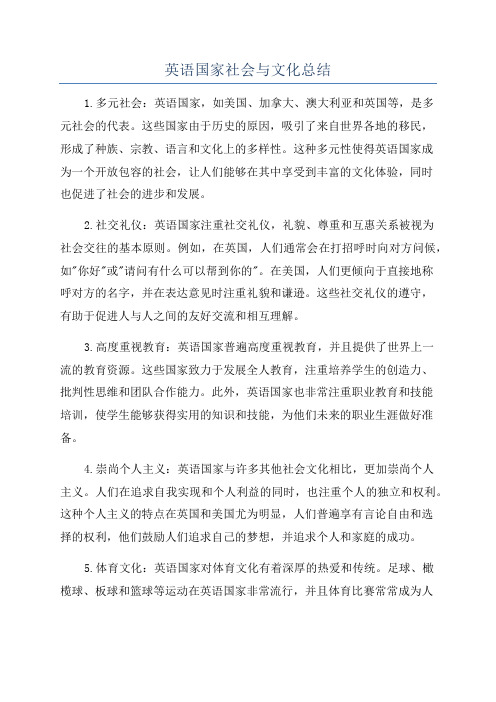
英语国家社会与文化总结1.多元社会:英语国家,如美国、加拿大、澳大利亚和英国等,是多元社会的代表。
这些国家由于历史的原因,吸引了来自世界各地的移民,形成了种族、宗教、语言和文化上的多样性。
这种多元性使得英语国家成为一个开放包容的社会,让人们能够在其中享受到丰富的文化体验,同时也促进了社会的进步和发展。
2.社交礼仪:英语国家注重社交礼仪,礼貌、尊重和互惠关系被视为社会交往的基本原则。
例如,在英国,人们通常会在打招呼时向对方问候,如"你好"或"请问有什么可以帮到你的"。
在美国,人们更倾向于直接地称呼对方的名字,并在表达意见时注重礼貌和谦逊。
这些社交礼仪的遵守,有助于促进人与人之间的友好交流和相互理解。
3.高度重视教育:英语国家普遍高度重视教育,并且提供了世界上一流的教育资源。
这些国家致力于发展全人教育,注重培养学生的创造力、批判性思维和团队合作能力。
此外,英语国家也非常注重职业教育和技能培训,使学生能够获得实用的知识和技能,为他们未来的职业生涯做好准备。
4.崇尚个人主义:英语国家与许多其他社会文化相比,更加崇尚个人主义。
人们在追求自我实现和个人利益的同时,也注重个人的独立和权利。
这种个人主义的特点在英国和美国尤为明显,人们普遍享有言论自由和选择的权利,他们鼓励人们追求自己的梦想,并追求个人和家庭的成功。
5.体育文化:英语国家对体育文化有着深厚的热爱和传统。
足球、橄榄球、板球和篮球等运动在英语国家非常流行,并且体育比赛常常成为人们社交娱乐的重要组成部分。
这种体育文化的存在,不仅有助于促进人们的健康和身体素质,也有助于建立团队精神和英勇精神。
总之,英语国家的社会和文化是多元性、社交礼仪、教育重视、个人主义和体育文化等多个方面的综合体现。
了解和理解这些特点,有助于更好地融入和适应英语国家的社会环境,并促进跨文化交流和交往的成功。
英语国家社会与文化入门-英国简答题

英语国家社会与⽂化⼊门-英国简答题英国Unit 31 What kind of institution(部门) is the House of Lords(上议院)? What role dose it play in British government?A: It consists of the Lords Spiritual(神职议员)who are the Archbishops(⼤主教) and most prominent(杰出的、卓越的)bishops(主教)of the church of England ;and the Lords Temporal(世俗议员),which refers to everyone else。
②They inherited(继承) the seat from their forefathers or been appointed by the sovereign(郡主、最⾼统治者).In parliament(议会)they speak and vote as individuals(个⼈),not as representatives(代表)of the greater interests of the country. They do not receive salaries and many do not attend Parliament at all.英国简答题unit53.What are the three main areas in national ecnomies?Describe the development of each of the three areas in the UK economy.答案National economies can be broken down into three main areas,”primary” industries,such as agriculture,fishing,and mining,”secondary”industries,which manufacture complex goods from those primary produets;and tertiary industuies.often descriibed as services,such as banking,insuranc,tourism,and the selling of goods.Britan’s agricultural sector is small(producing 1.4%of the national wealth)but efficient,producing 58% of the UK’s food needs with only 2%of its workforce.Three quarters of Britain’s land is used for agriculture.with about a quarter of that under crops-wheat and barley are the two commmnest.The rest is grazing for animals,including cattle (both dariy and beef),The fishing industy provides 55%of the UK demand for fish Sconish ports land the majortiy of the fish caught.In the secondary sector of the economy.manufacturing industry remains important,producing 22% of national wealth.British companies are are active in all major fields of manufacturing industry,but are particulary strong in pharmaceuticals(the British company Glaxo-Wellcrme is the biggest drug company in the world),chemicals([C]is the second largest paint manufacture in the world),aerospace(overall the UK industry is third in size in the world)and food drink (Scotch whisky being a major export).英国简答题unit71. What are the purposes of the British education system?please comment on these purposes.what are the main purposes of the Chinese education system?Are there any differences or similarities in the education of the two nations?Answer: 第⼀问The purpose of school is to provide children with literacy and the other basic skills they will need to become active members of society,But the purpose of the British education system is also to socialise children第⼆问Education in the People's Republic of China is a state-run system of public education run by the Ministry of Education. All citizens must attend school for at least nine years.The government provides primary education for six years, starting at age six or seven, followed by six years of secondary education for ages 12 to 18. Some provinces may have five years of primary school but four years for middle school.There are three years of middle school and three years of high school. The Ministry of Education reported a 99 percentattendance rate for primary school and an 80 percent rate for both primary and middle schools.In 1985, the government abolished tax-funded higher education, requiring university applicants to compete for scholarships based on academic ability. In the early 1980s the government allowed the establishment of the first private schools.China has had a major expansion in education, increasing the number of undergraduates and people who hold doctoral degrees fivefold in 10 years.[3]In 2003 China supported 1,552 institutions of higher learning (colleges and universities) and their 725,000 professors and 11 million students. There are over 100 National Key Universities, including Beijing University and Tsinghua University. Chinese spending has grown by 20% per year since 1999, now reaching over $100bn, and as many as 1.5 million science and engineering students graduated from Chinese universities in 2006. China published 184,080 papers as of 2008.Laws regulating the system of education include the Regulation on Academic Degrees, the Compulsory Education Law, the Teachers Law, the Education Law, the Law on Vocational Education, and the Law on Higher Education.第三问Chinese parents only expect their children to get straight A+'s and straight A's on their report cards, whereas the American education system does not do that as much.The American education system is more relaxed than the Asian culture when it comes to education and their parents don't push them hard as much to get straight A+'sand straight A's in school so that makes a big difference out the two education systems.The Chinese race of people in China, America, and all over the world push and force their children to get straight A+'s and straight A's all through school and college all through their lives and they are very strict about education and about them getting straight A+'s and straight A's all through school and college all through their lives.3.what are the major changes that have taken place since World war 2? Is British education moving towards more progress or more equality?Pick up some examples from the text to illustrate your points.答案:第⼀问Other major changes to the British education system were caused by world war Ⅱ。
朱永涛《英语国家社会与文化入门》笔记和考研真题详解-下册-第3章美国的起始【圣才出品】

朱永涛《英语国家社会与文化入门》笔记和考研真题详解-下册-第3章美国的起始【圣才出品】美国第3章美国的起始3.1 复习笔记I. What is an American?1. A new race2. Current situationII. Two Immigration Movements1. From Asia2. From Europe and AfricaIII. The Forces that led to the Modern Development of Europe1. The growth of capitalism2. The Renaissance3. The Religious ReformationIV. The Colonial Patterns1. The Settlement in Virginia2. Puritanism3. Catholic Maryland4. Quaker PennsylvaniaV. The American Revolution (The War of Independence)1. The Causes2. The Eve3. The Process4. The Major Leaders (The Founding Fathers)5. The SignificanceI. What is an American? (美国民族性)1. A new race(新的民族)(1) In 1782, the French farmer J. Hector St. John de Crevecoeur, who settled inPennsylvania, first asked this question in Letters from An American Farmer. (2) He thought the American was a new man who had the mixed blood ofEuropeans or their descendants, and who left behind him his ancient prejudices and manners and received new ones. Individuals were melted into a new race who acted upon new principles, entertained new ideas and form new opinions.The idea that America is a melting pot originated from his words.(1) 赫克托·圣约翰·德克雷夫克尔于1782年著成《美国农人简史》,首次提出了美国民族性这一问题。
英语国家社会与文化总结(一)
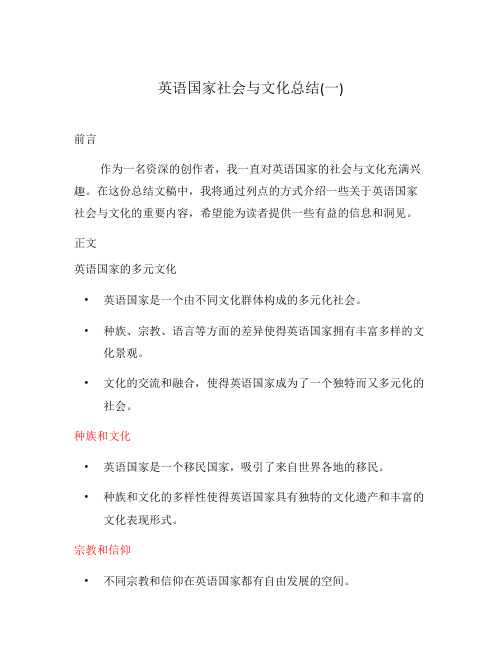
英语国家社会与文化总结(一)前言作为一名资深的创作者,我一直对英语国家的社会与文化充满兴趣。
在这份总结文稿中,我将通过列点的方式介绍一些关于英语国家社会与文化的重要内容,希望能为读者提供一些有益的信息和洞见。
正文英语国家的多元文化•英语国家是一个由不同文化群体构成的多元化社会。
•种族、宗教、语言等方面的差异使得英语国家拥有丰富多样的文化景观。
•文化的交流和融合,使得英语国家成为了一个独特而又多元化的社会。
种族和文化•英语国家是一个移民国家,吸引了来自世界各地的移民。
•种族和文化的多样性使得英语国家具有独特的文化遗产和丰富的文化表现形式。
宗教和信仰•不同宗教和信仰在英语国家都有自由发展的空间。
•基督教、伊斯兰教、佛教等信仰在英语国家都有一定的影响力。
语言差异•英语国家的语言差异同样也很明显。
•不同国家和地区的英语有着不同的口音和用法。
社会价值观与行为规范•英语国家的社会价值观和行为规范与其他文化有所区别。
•个人自由、平等、尊重和人权是英语国家的核心价值观。
•社会规范要求人们遵守法律,尊重他人的权利和个人空间。
个人主义与集体主义•英语国家的社会价值观倾向于个人主义,注重个人的权利和自由。
•个人的独立和自主意识在英语国家得到高度重视。
礼貌与社交规范•礼貌在英语国家的社交交往中非常重要。
•合适的问候、礼仪和社交规范被视为对他人尊重和社交技巧的表现。
法律与公平•英语国家的社会依法治国,法律在社会中起着重要的作用。
•公平和正义是社会发展的基础,法律公正的执行对于社会的稳定至关重要。
结尾通过对英语国家社会与文化的总结,我们可以看到其多元化和独特性。
不同的族群、宗教和语言差异构成了英语国家的丰富多样性。
个人主义、礼貌和法律执行等方面的社会价值观和行为规范也是英语国家的独特特点。
深入了解和理解英语国家的社会与文化,有助于我们更好地与英语国家的人交流和相互了解,也能更好地欣赏和体验其文化的魅力。
很抱歉,我的回答只有这么多内容。
英语国家社会与文化知识点

英语国家社会与文化知识点2. Diversity: English-speaking countries are known for their cultural diversity due to historical reasons like colonization and immigration. These countries host people from various ethnic, racial, religious, and linguistic backgrounds. It is importantto be open-minded and respectful of different cultural practices and values.3. Education: Education is highly valued in English-speaking countries, with a focus on providing quality education to their citizens. The education systems in these countries emphasize critical thinking, creativity, and practical skills. Some of the world's top-ranking universities are located in English-speaking countries.5. Sports: Sports play a significant role in English-speaking countries. Football (soccer) is highly popular in the United Kingdom and other parts of Europe, while Americanfootball, basketball, baseball, and ice hockey are popular inthe United States and Canada. Rugby is widely played inAustralia and New Zealand.6. Food and Drink: English-speaking countries have diverse culinary traditions. The United Kingdom is known for its traditional dishes like fish and chips, roast beef, andafternoon tea. The United States is famous for its fast food culture, while Australia is known for its barbecues and seafood.Craft beer and wine production are prevalent in these countries as well.7. Holidays and Celebrations: English-speaking countries have their unique holidays and celebrations. For example, in the United States, Independence Day is celebrated on July 4th with fireworks and barbecues. Christmas is a significant holiday in the United Kingdom, Australia, and New Zealand, with customslike exchanging gifts and decorating Christmas trees.8. Arts and Entertainment: English-speaking countries are renowned for their contributions to art, literature, music, theatre, and film. The United Kingdom has a rich literary tradition with renowned authors like Shakespeare, Dickens, and Rowling. Hollywood, located in the United States, is globally recognized for its film and entertainment industry.。
英语国家社会与文化学习重点
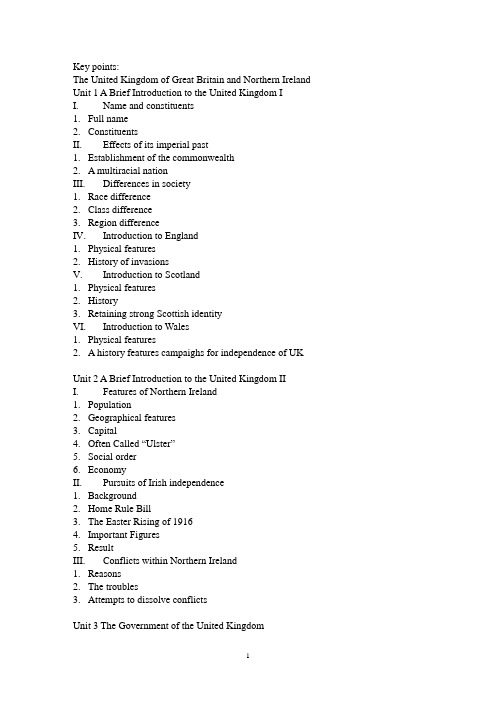
Key points:The United Kingdom of Great Britain and Northern Ireland Unit 1 A Brief Introduction to the United Kingdom I and constituents1.Full name2.ConstituentsII.Effects of its imperial past1.Establishment of the commonwealth2. A multiracial nationIII.Differences in society1.Race difference2.Class difference3.Region differenceIV.Introduction to England1.Physical features2.History of invasionsV.Introduction to Scotland1.Physical features2.History3.Retaining strong Scottish identityVI.Introduction to Wales1.Physical features2. A history features campaighs for independence of UK Unit 2 A Brief Introduction to the United Kingdom III.Features of Northern Ireland1.Population2.Geographical features3.Capital4.Often Called “Ulster”5.Social order6.EconomyII.Pursuits of Irish independence1.Background2.Home Rule Bill3.The Easter Rising of 19164.Important Figures5.ResultIII.Conflicts within Northern Ireland1.Reasons2.The troubles3.Attempts to dissolve conflictsUnit 3 The Government of the United KingdomI.Monarchy in history1.Origin2.Divine right of the King3.One short ousted period4.Magna CartaII.The history of Parliament1.Origin2.History3.Acquisition of powerIII.The birth of the Prime Minister and Cabinet1.Birth of Cabinet2.Birth of Prime MinisterIV.The British government and Constitutionernment system2.The ConstitutionV.Parliament Today1.Functions2.Status3.InstitutionsUnit 4 Politics, Class and RaceI.General elections1.Why are they important?2.When do elections occur?3.Who can stand for election as an MP?4.What happens in an election?5.Formation of governmentII.The political Parties1.The Labour party2.The Conservative Party3.The Liberal DemocratsIII.Class1.Class-divisions2.Cultural differences3. A distinctive features of British class-system IV.Race1. A multiracial nation2.Influences of immigrationUnit 5 The UK EconomyI.Events in History1.Dominant in the 1880s2.Overtaken in 19003.Declince since 19454.Privatization in the 1980sII.The current UK economy1.Primary industry2.Secondary industries3.Tertiary industriesIII.Case study: the aerospace industry1.Status2.Major achievements3.Recent changesUnit 6 British LiteratureI.Early Writing1.Theme2.Beowulf3.Canterbury Tales4.The legend of King ArthurII.The 15th and 16th centuries1.Elizabethan Drama2.Christopher Marlowe3.William ShakespeareIII.The 17th century1.King James Bible2.Francis Bacon3.John MiltonIV.The 18th century1.Features2.Johnathan Swift3.Robert Burns4.Daniel DefoeV.The 19th century1.Romanticism2.Poetry3.NovelVI.The 20th century1.Modernism2.Postmodernism3.Joseph Conrad4.Virginia Woolf5. D.H. Lawrence6. E.M.FosterUnit 7 English Education SystemI.Purpose of Education1.To teach “the three R’s”2.To socialize childrenII.The relationship between education and social class1.Inequality in British education2.Good Education Guarantees a careerIII.The influence of the Church on schooling1.In the past2.At present3.ChangesIV.Major changes to British education system1.Involvement of government2.The 1994 Education Act3.Introduction of comprehensive schools4.“The Great Education Debate”5.National Curriculum in 1989V.The present education systemcation in the UK is compulsory2.State sector and private sector schools3.Schooling stages and examsVI.Higher education1.Fund2.Founding Time3.Open university4.Degree titlesUnit 8 British Foreign RelationsI.Britain then and now1.The end of British Empire2.Britain todayII.The foundations of Britain’s Foreign Policy1.Imperial history2.Geoplitical traitsIII.How foreign policy is made?1.The Prime Minister and Cabinet2.The Foreign and Commonwealth Office (FCO)3.The Ministry of Defense4.The Department of Trade and Industry5.The treasury6.Electorate7.Foreign relationsIV.Britain and international institutions1.A member of UN Security Council (UNSE)2. A member of European Union (EU)3. A member of CommonwealthV.Britain and the United States1.Special Relationship2.Ups and downsVI.Britain security and defense1.Britain’s defense power2.Britain’s defense policyUnit 9 The British MediaI.Popularity2.Newspapers3.RadioII.FunctionsIII.Newspapers1.Long history2.The role of newspapers3.Freedom of press4.National papersIV.The broadcast media (TV and Radio)1.Why is TV popular?2.British IV culture3.The British Broadcasting Corporation (BBC) Unit 10 Sports, Holidays and Festivals in BritainI.Sports1.Football2.Tennis3.Cricket4.Golf5.Horsy sportsII.Religious holidays1.Christmas2.Easter3.RamadanIII.National holidays1.The Queen’s birthdayIV.Holidays in England1.Bonfire Night (Guy Fawkes Night)V.Holidays in Northern Ireland1.The Orange March2.St Patrick’s DayVI.Holidays in Scotland1.Hogmanay2.The Burns Night3.HalloweenVII.Holidays in WalesVIII. 1.EistenddfodIrelandUnit 11 Land, People and HistoryI. The island of Ireland1.Location2.ConstituentsII. Geographynd2.Climate3.EnvironmentIII. Population1.Features2.The Great Famine3.EmigrationsIV. History1.The Celts2.The coming of Christianity3.Viking invasion4.English invasion5.Irish independenceUnit 12 Politics and EconomyI. Political system1.A representative democracy2.A RepublicII. Structure of Irish government1.President2.The Government3.ParliamentIII.The electoral system1.V oting in elections and referenda2.Electorate3.Proportional representationIV. The Civil service1.Neutrality2.Structure3.SelectionV. The Irish legal system1.The hierarchy of the Irish legal system2. Judges3. Check and balanceVI. Transformation of Irish economy1.In the past2.At present3.ReasonsVII.Ireland’s accession to the EU1.Economic benefits2.Social changesVIII.Ireland today1.Home-ownership2.Transportation3.Living standardsUnit 13 Irish Culture: How the Irish Live NowI.Rapid social change1.Abolition of primogeniture2.Change of women’s lifestyle3.Dislocations of social wealthII.Differnces between Ireland and English1.Religionnguage3.Economy4.OpennessIII.Attitudes towards English1.Ambivalence2.Stereotypes from the EnglishIV.The Roman Catholic Church1.The Roman Catholic values2.The power of Roman Catholic Church3.Lose of power4.The difference between Catholics and Protestants V.The Family1.Changes in family life2.Reason for the changes3.Objectives of women’s movementVI.Pub culture1.What is a “pub”?2.Negative EffectVII.Work culture1.Work practices2.Trade Unionscation1.First-level schools2.Second-level schools3.V ocational schools4.Third-level educationUnit 14 Irish Culture: Language, Literature and Artsnguage1.Irish under political unrests2.Hiberno-EnglishII.Oral culture1.Features2.Origin3.Positive effectsIII.Literature1.The first Irish poem2.Nobel Prize winners for Literature3.Other important figuresIV.Music and Dance1.The Irish pipe2.Riverdance3.Irish harpV.Sports culture1.Soccer (football)2.Rugby football3.Cricket and tennis4.Hurling5.Golf6.Horse-racingVI.Science and Technology1.Distinguished figures2.Important societiesVII.The Irish identity in the world1.The Irish diaspora2.Attitudes towards other countriesAustraliaUnit 15 The Land and the People of the DreamingI.Natural of Features of the land1.Location2.Size3.Constituents4.Distinctive faunandscape6.Distinctive physical featuresII.The people1.The indigenous people2.The later settlersIII.Dreamtime and Dreaming1.What is “Dreamtime”?2.What is “the Dreaming”?IV.British colonization1.Terra Nullius2.Exploitation of the land3.The impact of colonization4.The policies of segregation and exclusion5.The policy of AssimilationUnit 16 Australia Culture LifeI.Protestantism1.Status2.Values3.Protestantism and CapitalismII.Anglicanism1.Status2.DeclineIII.Catholicism1.Status2.Reasons for its dominance3.Social rolesIV.Religion and rapid social change1. A consumerist society2. Fundamentalism3. SecularismV. Non-Christian religions1. Buddhism2. Islam3. Hinduism4.JudaismVI. Sport-an Australia religion1.Variants2.Sport figuresUnit 17 Work and Family LifeI.Australia as a penal colony1.Establishment of colonies2.Convict colonies3.“Free” coloniesII.Forms of families1.Formation of new families2.Convict partnerships3.Currency children4.“Free” familiesIII.Work in the penal colony1.Convict labour2.Emancipists3.Important figuresIV.From Convict Transportation to “Free” Migration1.Suspension of convict transportation2.“Free” Migrationernment-assisted migrationUnit 18 Australia as a Liberal Democratic SocietyI.Central value of the countryII.Political system1.The Washminster form of polity2.Three- tier system of government3.Two houses of the federal parliament4.The Governor-General5.The Prime Minister6.The pluralist form of governmentIII.Economy and politics1.What is Australia’s economy like?ernment involovement3.Dismantling of government involvementIV.Three political economic programmes1.Concept of the programmes2.Shift of focus in AustraliaUnit 19 Australia in the World TodayUnit 20 From Racism to MulticulturalismI.Immigration in history1.The 19th century2.White Australia Policy 19013.Post World War II period4.Multiculturalism from 19735.Migration TodayII.Struggle of the Aboriginality1.The relationships between the colonizers and the Peoples of the Dreaming2.The Aboriginal Protection Act of 19093.Day of Mourning and Protest4.The 1946 Stockmen’s Strike5.Strike of the Gurimdji people in the 1960s6.Freedom Rides in the 1960s7.The Mabo Decision8.The Wik Decision9.Social inequality todayIII. The history wars1.The rejection of the “dark side”2.Criticisms on this rejectionNew ZealandUnit 1 Land, People and HistoryI.Geography, land and enviroment1.Geography2.Weather3.Wildlife---- unique flora and faura4.Enviromental responsibilityII.The New Zealanders1.Populationnguage3.Human rights4.Standard of livingIII.Maoritanga1.Definition2.Legends about Maui3.Maori society4.Race relations5.Maori languageIV.History1.First settlers of the Islands2.European Navigators3.Maori and Pakeha4.The Post-war YearsUnit 2 Political System, Education and Economyernment1.The Constitution2.Parliament3.Election4.The Cabinet5.Public servants6.Reform7.The Ombudsman8.Local governmentcation1.Early childhood education2.Primary schools and secondary schools3.The Correspondence School4.State schools and private schools5.Special needs education6.Universities and polytechnicsIII.Economy1.Agriculture2.Forestry and fishing3.Energy4.Overseas tradeThe United States of AmericaUnit 3 American BeginningsI.What is an American?1. A new race2.Current situationII.Two Immigration Movements1.From Asia2.From Europe and AfricaIII.The Forces that led to the Modern Development of Europe1.The growth of capitalism2.The Renaissance3.The Religious ReformationIV.The Colonial Patterns1.The Settlement in Virginia2.Puritanism3.Catholic Maryland4.Quaker PennsylvaniaV.The American Revolution ( The War of Independence)1.The Causes2.The Eve3.The Process4.The Major Leaders (The Founding Fathers)5.The SignificanceUnit 4 The Political System in the United StatesI.The Articles of Confederation1.The background2.The reasons for its failureII.The making of the US Constitution1.The Constitutional Convention2.The ConstitutionIII.The three branches of the federal government1.Legislative brance2.Executive branch3.Judicial branchIV.Checks and balances1.The origin2.The purposeV.The Bill of Rights1.The components2.The purpose3.The contentsVI.Political parties1.The Democratic Party2.The Reppublican Party3.The electionUnit 5 American EconomyI.Industrial Revolution in America1.The backgournd2.The development3.Service industriesII.Free enterprise1.The significance2.Capital3.StockIII.The roots of affluence1.The land and the population2.Other factorsIV.American Agriculture1.The siginificance2.Agribusiness3.Migrant workers4.The success and problemsUnit 6 Religion in the United StatesI.American history and religious liberty1.American history2.Religious libertyII.The Three Faiths1.Protestants and different Protestant groups2.Catholics3.Judaism4.The relationsIII.Religious diversity1.Various religious groups2.The conflictsIV.Characteristics of American religious beliefs1.Three main characteristics2.The significance of religious beliefs.Unit 7 American LiteratureI.Post-Revolutionary period1.Washington Irving2.James Fenimore CooperII.Transcendentalishts1.Ralph Waldo Emerson2.Henry David ThoreanIII.Power of Imagination1.Edgar Allan Poe2.Nathaniel Hawthorne3.Herman MelvilleIV.New Vision of America1.Walt Whitman2.Leaves of GrassV.Reform and Liberation1.Harriet Beecher Stowe2.Uncle Tom’s CabinVI.Regionalism1.Mark Twain2.Emily DickinsonVII. A new wave1.The naturalists2.Other writersVIII.Sympathetic views of women writers1.Kate Chopin2.Willa CatherIX.Rebellious Spirit1.The writers2.The similarityX.The Modernists1.Ezra Pound2.T.S. EliotXI.The “Lost Generation”1.The background2.The writersXII.Harlem Renaissance1.The development2.The poetsXIII.New Drama1.Eugene O’Neil2.The major playsXIV.Depression Realism and Escapism1.John Steinbeck2.Margaret MitchellXV.Postwar voices and the “Beat Generation”1.African American writers2.American Jews3.In the theater4.The “Beat Generation”XVI.New American V oices1.Black wmen writers2.Chinese-American writersUnit 8 Education in the United Statescation in America today1.The goal2.Public schools and private schoolsII.Different education laws for different states 1.The similarities2.The differencesIII.Several levels of schooling1.Elementary school2.Secondary schoolcation in a new nation1.The influence of the Puritans2.The state and educationV.New development1.Equal education opportunities2.Strong demand for higher educationVI.Higher Education1.The requirements2.The complex system3.Varieties of colleges and universities4.Trends in degree programscation for all1.The Servicemen’s Reajustment Act2.Affirmative Action Programs3.Non-traditional studentsUnit 9 Social Movements of the 1960sI.The beginning1.Greensboro “Sit-in”2.Three kinds of social movementsII.About the social movements1.The causes2.The members3.What is a social movement ?III.The Civil Rights Movement1.The processanizations3.Direct Action Tactics4.ChangesIV.The Youth Movement/ Anti-War Movement1.Free Speech Movement2.“Counterculture”3.The Anti-War MovementV.Women’s Liberation Movement1.The beginning2.NOWUnit 10 Social Problems in the United StatesI.Racial problems1. A nation of immigrants2.Inequality in American society3.Discrimination against blacks4.The black “underclass”II.Poverty1.Current situation2.The consequencesIII.Drug Abuse1.Current situation2.Social costsIV.Crime1.The profile of a typical criminal2.Racial prejudice in the high rate of arrests3.White-collar crimesV.The abuse of power1.The abuse of power by government2.The abuse of power by corporationsUnit 11 American Way of Life: A Search for Credible Generalizations Unit 12 The Women’s Liberation Movement in AmericaUnit 13 Technology in AmericaI.DefinitionII.Early 19th Century1.Eli Whitney2.John H. Hall3.Cyrus H. McCormick4.The Stevens and transportation5.Samuel F. B. Morse6.Alexander Garden Bellte 19th Century1.Thomas Alva Edison2.Taylorism and FordismIV.Early 20th Century1.Reginald Fessenden2.Lee De Forest3.Further development of the radioV.Mid-20th century1.Radio shows2.Household technologieste 20th Century1.The Age of Visual Informationitary research and development used in peacetimeUnit 14 Post-WWII American Foreign PolicyI.The beginning of the Cold War1.Basic situation2.The Cold WarII.Arms race and the containment policy1.Arms race2.The containment policyIII.Engagement and expansion1.Basic situation2.The background3.The policyIV.Unilateralism and faith in military strength1.Unilateralism2.Sept.11 terrorist attack3.The strategy of preemption4.War on IraqUnit 15 Sports and Scenic Spots in AmericaI.Sports1.The American Football2.Baseball3.Baseketball4.Other sports activitiesII.Scenic spots1.The Grand Canyon2.The Southwest3.The Northwest4.The Rocky Mountains5.The Pacific Coast6.The Middle West7.Florida8.The Southeast9.The Northeast10.New York State11.Urban scenesUnit 16 American Popular Culture: Movies and MusicI.Jazz music1.The reasons for its popularity2.CharacteristicsII.Early New Orleans jazz1.Early jazz music2.BluesIII.Jazz in Chicago and New York in the 1920s1.Two styles2.The musiciansIV.The piano1.The history2.Ragtime music3.“Stride” pianoV.Boogie Woogie1.The development2.CharacteristicsCanadaUnit 17 The Country and Its PeopleI.Canada and the Canadian identity1.Canada2.The Canadian identityII.The regions of Canada1.Basic situation2.The north3.The west4.The prairies5.Central Canada6.The Altantic regionIII.History1.The First Nations2.European settlement3.The ConfederationIV.The origin of the word “Canada” and place names.1.The word “Canada”2.Place namesUnit 18 The Government and Politics in CanadaI.Historical background1.Canada’s political system2.Canadian system and American system3.Tolerance of different values and customsII.Structures of government1.Canada’s system of government2.The House of Commons and the SenateIII.The federal political scene1.National parties2.Regional partiesIV.Canadian prime ministers1.Pierre Trudeau2.Brian Mulroney3.Jean Chretien4.Similarities of the three leadersUnit 19 The Canadian MosaicI.Mosaic and multiculturalism1.Mosaic2.MulticulturalismII.The First Canadians1.The First Nations2.The Inuit3.The Metis4.Their situationIII.The settlers1.The base of Canada’s immigration policy2.The development3.ChangesIV.French Canadians1.Population distribution2.The problem3.The SolutionsUnit 20 The Canadian EconomyI.Three factors influencing Canadian economy1.Geography and population2.The United States3.Federal governmentsII.History1.The original patterns2.Changes3.Protectionism and free tradeernment intervenionismIII.The Canadian- US Free Trade Agreement1.The background2.The content3.Problems4.BenefitsIV.Three groups of industry1.Primary industries2.Secondary industries3.Tertiary industries4.ProportionV. Canada’s place in the World economyUnit 21 Canadian LiteratureI.The Literature of Survival1.Survival in Nature2.Cultural SurvivalII.Native Canadian MythologyIII.Early Colonial Literature1.Background2.An Era of ReportingIV.The Literature of Nation-Building1.Background2.The Era of Realism in Literature3.Writers and WorksV.Canada in the Ascendant1.The “Montreal Group” of Poets2.Ted Allan3.Literature in the French LanguageVI.Canadian Literature in the Modern World1.Main Features2.Writers and WorksUnit 22 Canada’s International RelationsI.Introduction1.Canada’s role in the world2.Canada as a “junior partner”3.Canada as a “middle power”II.Political Geography1.Geographical Influence2.Canada’s role in international Organizations3.Canada as a “middle power”III.Political Geography1.Geographical Influence2.Canada’s role in international Organizations IV.From Junior Partner to Middle Power1.Canada in “the vortex of European militarism”2.Conscription Crisis3.Canada’s golden age of international diplomacy V.Canada’s Military Commitments1.Involuntary Military Guarantees2.Independent foreign policy3.“Free rider”VI.Canadian-American Relations1.Close in relationship2.Defense Policy3.Economic interests4.DifferencesVII.Overseas Development Programs1.Attitude towards the Third World2.Peace and security promotion。
《英语国家社会与文化入门》(第3版)(朱永涛、王立礼主编)(复习笔记 爱尔兰的文化:语言,文学和艺术

14.1复习笔记nguage1.Irish under political unrests2.Hiberno-EnglishⅡ.Oral culture1.Features2.Origin3.Positive effectsⅢ.Literature1.The first Irish poem2.Nobel Prize winners for literature3.Other important figuresIV.Music and dance1.Sean nos2.The Irish pipe3.Irish dancing4.Irish harpV.Sports culture1.Soccer(football)2.Rugby football3.Cricket and tennis4.Hurling5.Golf6.Horse-racingVI.Science and technology1.Distinguished figures2.Important societiesⅦ.The Irish identity in the world1.The Irish diaspora2.Attitudes towards other countries or areasnguage(语言)1.Irish under political unrests(政治动荡下的爱尔兰语)(1)Irish or Gaelic is an ancient language spoken by the Irish people.(2)Under the English colonial policy,many people,especially the middle and professional classes,lost this language and never regained.But until the mid-19th century,Irish was still spoken widely by the peasant classes.(3)The death blow to the Irish language was the Great Famine of1845—1848,since two million Irish people emigrated or died in this event.(4)In the late19th century,an attempt was made to revive the use of the Irish language among the middle and professional classes.(5)After achieving national independence,official attempt was made to make Irish again the national language.(6)Irish is now a compulsory subject in schools and the first official language in the Republic.(1)爱尔兰语,也称盖尔语,是爱尔兰人的古老语言。
英语国家社会与文化入门知识考点总结

Unit1.(选择、判断、填空)1. The flag of Britain :Union Jack2. The capital of each country :3. The time joining the British parliament:However, in 1707 by agreement of the English and Scottish parliaments, Scotland joined the Union.4. Difference between the British Isles ,UK, Great Britain , and England:British Isles:the island of Great Britainthe island of Irelandsurrounding islesUK=Great Britain + Northern IrelandGreat Britain =England +Scotland + Wales5. The four major invasions in the history of Great Britain :At first, England was occupied by Celtic people.Then in 43AD Britain was invaded by the Roman empire.Result: England and Wales became a part of the Roman empire for nearly 400 years.the Angle-Saxon invaded.Result: The land they lived became" Angle-land",later changed into England, the language they spoken became English.the Vikings invaded.Result in a certain cultural divide between northerners and southerners in England, which can be expressed as "Saxon" versus "Dane".the Normans , William of Normandy invaded this country.Result: This marks the last time that an army from outside the British Isles succeeded in invadingLondon: (P18)Unit2(选择、判断、填空)Northern Ireland (often called "Ulster"after an ancient Irish kingdom)1. Activities to seek Irish independence :Home -ruleThe Easter Rising of 1916: was the most spectacular event, in which the rebels took over Dublin's Post Office, forcing the British to retake it by military means.2. Political parties:the Sinn Fein partySDLP: Social Democratic and Labour PartyIRA: Irish Republican Army (illegal)3. Political troubles in Northern Ireland (famous):Indigenous Roman Catholicsv s. Protestant immigratesPartition(分割) : The southern 26 counties would form an independent "free state", while the 6 north-eastern counties would remain a part of the UK.(即26 Republic Ireland ,6 Northern Ireland )4. the Good Friday Agreement 了:( 解下,P36)Unit 31. Process of state building:The process of state-building has been one of evolution rather than revolution.2. The oldest institution of government in Britain :Britain is both a parliamentary democracy and a constitutional monarchy.3. Divine right of kings :It was held that the sovereign derived his authority from God, not from his subjects.4. Magna Carta :limits on the king's ability to abuse his royal power.5. the Bill of Rights :ensured that the King would never be able to ignore Parliament. ( William of Oran时ge 期)6. The Constitution :(P49)7. The functions of parliament (: P49)8. Parliament:The queen : (symbolised ,traditional )She is legally head of the executive, anin tegral part of the legislature, head of the judiciary, commander in chief of the armed forces and "supreme governor" of the Church of England,a confidante to the Prime Ministe(r 了解下)The House of Lords :do not receive salaries,both sexist and elitist 了( 解下) Lords Spiritual hereditary peersLords Temporal life peersThe House of Commons (P49) 重要Unit41. The importance of general elections:(P67重) 要2. The electoral campaigns :(P67)3. The formation of the government :(P67)4. The class system in theUK:(P67)5. Ethnic relations in the UK:(P67) 了解下6. The main political parties in the UK:The Conservative party( newest) : setting up the National Health ServiceThe Labour party :From 1979 to 1997,t he Conservative Party won 4 elections in row The Liberal Democrats: a party of the "middle"Margaret-Thatcher 改革(There were also negative consequence了s)解下Unit5(判断、选择、填空)1、Absolute Decline2、Relative Decline of the UK economy: (P81)重要3、the reason for its relative decline 了:(解下)the country had gone heavily into debt in order to finance the warthe era of empire was overLarge military expensesOutdated industries and less-competitive productsA lack of close relationship between industry and banks4. The division of British industries :Primary industries (mining industry 矿业)Secondary industries (steelindust钢ry铁业)Tertiary industries (insurance保险,the selling of goods)5. The City: The name given to the historic area at the centre of London6. The London Stock ExchangeT: he heart of the City(伦敦的中心是伦敦城,伦敦城的中心是伦敦证券交易所)Unit6(填空、选择、判断)1. Beowulf :One of the oldest of these early "Old English" literary works is a long poem from Anglo-Saxon times called Beowulf.2. Geoffrey Chauce:r The Canterbury Tales3. Elizabethan Drama:Marlowe :The Tragical History of Dr FaustusWilliam Shakespeare:Romeo and Juliet The Taming of the ShrewHamlet A Midsummer Night's Dream tragedies Othello comedies Twelfth Night重要)King Lear The TempestMacbeth.history plays:Richard III, Richard II, Henry IV, and Henry V. Julius Caes,ar Antony and Cleopatra4. The 17th Century:John Milton : Paradise Lost5. The 18th Century:Jonathan Swift :Gulliver's Travels6. The Romantic Period:William Wordsworth and Samuel Taylor Coleridg:eLyrical Ballads ( marked the beginning of the Romantic Period.)George Gordon, Lord ByronThree men John KeatsPercy Bysshe Shelley7. The Nineteenth Century Novel:Mary Shelley :FrankensteinSense and SensibilityJane Austen Pride and PrejudiceEmmaCharlotte : Jane Eyrethe Bronte sisters Emily: Wuthering HeightsAnnElizabeth Gaskell :N orth and SouthOliver TwistCharles Dickens David CopperfieldGreat ExpectationsThe Return of the NativeThomas Hardy Tess of the D' UrbervillesJude the Obscure8. Female writers in the 1th9 century of Britain:Mary ShelleyJane Austenthe Bronte sistersElizabeth Gaskell9.20th Century Literature :Twentieth century literature can be broadly divided into two stylistic periodMs:o dernism,and Postmodernism.Joseph Conrad:The Heart of DarknessMrs. DallowayVirginia Woolf To the LighthouseOrlandoA Room of One's OwnD. H. Lawrence :S ons and LoversUnit71. The purpose of the British education system:①provide children with literacy and the other basic skills②socialise children③children are taught practical skills④learn the rules and values⑤participate in the community⑥contribute to the economic prosperity of an advanced industrial economy.2. The influence of the church on schooling: education was voluntary and many of the schools that existed were set up by churches.religious education was the only subjectDaily prayers and singing hymns is still a regular part of school life3. The National Curriculum:All children throughout the country must study the following subjects: English,mathematics, science, religious education, history, geography, technology, music, art, physical education, and a modern foreign language.All children throughout the country must pass national tests and schools.All teachers are told what to teach and their schools are now ranked according to how well they perform this task.4.State school:93% of pupils receive free education from the public sector.5.Independent school(public schools/ private school):Independent schools are not part of the national education system.Etor schoolLarrow schoolWinchester college6. Comprehensive school:Entrance exams were abolished.Such schools provide a general education. Pupils can study everything from academic subjects like literature and sciences, to more practical subjects like cooking and carpentry.7. Grammar schoo:lThose who show academic potential are admitted to the grammar schools where the emphasis is on advanced academic work rather than the more general curriculum of the comprehensive schools.8. GCSE:General Certificate of Secondary Education9. GCEA :General Certificate of Education-Advanced10. GNVQs :General National Vocational Qualifications11. The universities in Britain:British universities are public bodie,s except one university, the University of Buckingham.12. The Open University:The Open University offers a non-traditional route for people to take university level courses and receive a university degree , through textbooks, tv and radio broadcasts, correspondence, videos, residential schools and a network of study centres.Unit81. Countries to establish UN:2. The permanent members of the UN Security Council:the Soviet Union, the United States, China ,France, UK3. The foundations of Britain's foreign policy:The contemporary foreign policy of the UK is greatly influenced by its imperial history and also by its geopolitical traits4. The making of Britain's foreign polic:y(P128)5. The relationship between Britain and the E U(P128)The decision joined the EEC ( psychological , natural , controversial )The UK has always been less enthusiastic about giving up its national sovereignty to a European government.6. The commonwealth: Britain is also a member of the Commonwealth, a voluntary association of states .There are 50 members of the Commonwealthhich is made up mostly of former British colonies.7. NATO ( North Atlantic Treaty Organisation ) :protect member states against aggressionThe purpose of NATO provide a foundation for security in Europeprovide a forum for transatlantic defence cooperation8.Special relationship with US h:as gone through many up and downs9.Independent nuclear weapons capability:Britain is a traditional sea power.Unit91. The division of British media: (降序排列)①TV②Newspaper (In Britain, most advertising is carried in newspapers)③Radio④Magazine2. The functions of the British media:①Entertainment②Provide British people with information about political and social issues③Provide weather reports④Carry advertising⑤Used for educational purposes⑥Provide a forum for people to write letters or phone in to express their views or seek advice⑦Help Britain engender national culture3.Oldest newspaper:The world's oldest national newspaper : The ObserverThe British oldest daily newspaper: The TimesThe very names of British newspapers-The Times, The Observer, The Guar—diasntill suggest that the function of the paper is to offer the electorate objective reports about what is happening in the country4. Papers issued internationally:The Financial Times is printed in Frankfurt, France, Hong Kong, New Jersey, Los Angeles, Tokyo and Madrid. ( (Daily)Telegraph / The News of the World )5. Quality press and gutter press:The Daily TelegraphThe Times6. Fleet street:It is also known as the Street of Shame7. BBC:(P144)Unit101.Sports born in Britain :Cricket, football, lawn tennis, golf, rugbyFA Cup:(Football Association Cup)2.Football violent sportGentle sport3. Tennis WimbledonWimbledon is where the world's best players gather to compete on gracsosu rts. It is one of the major events of the British sporting calendar and probably the most famous tennis event in the world.4. Cricket:Cricket was one of the very first team sports in Britain to have organised rules and to be The Sun gutter pressThe Guardian The ObserverQuality pressplayed according to the same rules nationally.5. Golf:The game of golf was invented by the Scottish.6. Horse sports:Flat racingHorse racing steeplechasingThe Grand NtionalThe Royal Asot : people usually dress up and show off their fashionable cloth and elaborate hats for the social eventEquestrianismHunting7. Three traditions of Christmas(P: 163)the Christmas Pantomimethe Queen's Christmas messagethe Boxing Day : Traditionally, it was on Boxing Day that people gave Christmas gifts or money to their staff or servants.8. Religious holiday:crucifixion n and resurrection of Jesus Christ EasterChristmas9. National Holidays:---- Queen's Birthday"trooping the colour" around Buckingham Palace10. Holidays in the 4 nations:England:Guy Fawkes Night (the Bonfire Night, celebrated in November) Northern Ireland:St Patrick's Day(March 17)Orange Marches,Battle of the Boyne (July 12) Scotland:Hogmanay (12.31)Burns Supper(1.25)Halloween (10.31)Wales:The Eisteddfod: festival of music making and poetry。
- 1、下载文档前请自行甄别文档内容的完整性,平台不提供额外的编辑、内容补充、找答案等附加服务。
- 2、"仅部分预览"的文档,不可在线预览部分如存在完整性等问题,可反馈申请退款(可完整预览的文档不适用该条件!)。
- 3、如文档侵犯您的权益,请联系客服反馈,我们会尽快为您处理(人工客服工作时间:9:00-18:30)。
Unit1.(选择、判断、填空):UnionJack:3.ThetimejoiningtheBritishparliament: However,in 1707byagreementoftheEnglishandScottishparliaments,Scotlandjoinedthe Union.4.DifferencebetweentheBritishIsles,UK,GreatBritain,andEngland: BritishIsles: theislandofGreatBritaintheislandofIrelandsurroundingislesUK=GreatBritain+NorthernIrelandGreatBritain=England+Scotland+Wales5.ThefourmajorinvasionsinthehistoryofGreatBritain:Atfirst,EnglandwasoccupiedbyCelticpeople.Thenin43ADBritainwasinvadedbytheRomanempire.Result:EnglandandWalesbecameapartoftheRomanempirefornearly400years. theAngle-Saxoninvaded.Result:Thelandtheylivedbecame"Angle-land",laterchangedintoEngland,thelanguage theyspokenbecameEnglish.theVikingsinvaded.ResultinacertainculturaldividebetweennorthernersandsouthernersinEngland,which canbeexpressedas"Saxon"versus"Dane".theNormans,WilliamofNormandyinvadedthiscountry.Result:ThismarksthelasttimethatanarmyfromoutsidetheBritishIslessucceededininv adingLondon:(P18)Unit2(选择、判断、填空)NorthernIreland(oftencalled"Ulster"afteranancientIrishkingdom)1.ActivitiestoseekIrishindependence:Home-ruleTheEasterRisingof1916:wasthemostspectacularevent,inwhichtherebelstookoverD ublin'sPostOffice,forcingtheBritishtoretakeitbymilitarymeans.:theSinnFeinpartylegalSDLP:SocialDemocraticandLabourPartyEngland LondonScotland EdinburghWales CardiffNorthern Ireland BelfastIRA:IrishRepublicanArmy(illegal)3.PoliticaltroublesinNorthernIreland(famous):Partition(分割):Thesouthern26countieswouldformanindependent"freestate",whilethe6north-easterncountieswouldremainapartoftheUK.(即26RepublicIreland,6NorthernIreland):(了解下,P36)Unit3:Theprocessofstate-buildinghasbeenoneofevolutionratherthanrevolution.:Britainisbothaparliamentarydemocracyandaconstitutionalmonarchy.:ItwasheldthatthesovereignderivedhisauthorityfromGod,notfromhissubjects.:limitsontheking'sabilitytoabusehisroyalpower.:ensuredthattheKingwouldneverbeabletoignoreParliament.(WilliamofOrange时期):(P49):(P49):Thequeen:(symbolised,traditional)Sheislegallyheadoftheexecutive,anintegralpartofthelegislature,headofthejudici ary,commanderinchiefofthearmedforcesand"supremegovernor"oftheChurchofEngland,aconfidantetothePrimeMinister(了解下)TheHouseofLords:donotreceivesalaries,bothsexistandelitist(了解下) LordsSpiritualhereditarypeersLordsTemporallifepeersTheHouseofCommons(P49)重要Unit4:(P67)重要:(P67):(P67):(P67):(P67)了解下:TheConservativeparty(newest):settinguptheNationalHealthServiceTheLabourparty:From1979to1997,theConservativePartywon4electionsinrow TheLiberalDemocrats:apartyofthe"middle"Margaret-Thatcher改革(Therewerealsonegativeconsequences)了解下Unit5(判断、选择、填空)1、AbsoluteDecline2、RelativeDeclineoftheUKeconomy:(P81)重要3、thereasonforitsrelativedecline:(了解下) thecountryhadgoneheavilyintodebtinordertofinancethewartheeraofempirewasoverLargemilitaryexpensesOutdatedindustriesandless-competitiveproducts Alackofcloserelationshipbetweenindustryandbanks4.ThedivisionofBritishindustries:Primaryindustries(miningindustry矿业)Secondaryindustries(steelindustry钢铁业)Tertiaryindustries(insurance保险,thesellingofgoods):ThenamegiventothehistoricareaatthecentreofLondon:TheheartoftheCity(伦敦的中心是伦敦城,伦敦城的中心是伦敦证券交易所)Unit6(填空、选择、判断): Oneoftheoldestoftheseearly"OldEnglish"literaryworksisalongpoemfromAnglo-Saxon timescalledBeowulf.:TheCanterburyTales:Marlowe:TheTragicalHistoryofDrFaustusRomeoandJulietTheTamingoftheShrewtragedies Othello(重要)Macbeth.historyplays:,AntonyandCleopatra:JohnMilton:ParadiseLost:JonathanSwift:Gulliver'sTravels:WilliamWordsworthandSamuelTaylorColeridge:LyricalBallads (markedthebeginningoftheRomanticPeriod.)GeorgeGordon,LordByronThreemenJohnKeatsPercyByssheShelley:MaryShelley:FrankensteinSenseandSensibilityJaneAusten PrideandPrejudiceEmmaCharlotte:JaneEyretheBrontesistersEmily:WutheringHeightsAnnElizabethGaskell:NorthandSouthOliverTwistCharlesDickens DavidCopperfieldGreatExpectationsTheReturnoftheNativeThomasHardy TessoftheD’UrbervillesJudetheObscure:MaryShelleyJaneAustentheBrontesistersElizabethGaskell:Twentiethcenturyliteraturecanbebroadlydividedintotwostylisticperiods:Modernis m,and Postmodernism.JosephConrad:TheHeartofDarknessVirginiaWoolf TotheLighthouseOrlandoARoomofOne'sOwn1.:Allchildrenthroughoutthecountrymuststudythefollowingsubjects:English,mathe matics,science,religiouseducation,history,geography,technology,music,art,p hysicaleducation,andamodernforeignlanguage.Allchildrenthroughoutthecountrymustpassnationaltestsandschools.Allteachersaretoldwhattoteachandtheirschoolsarenowrankedaccordingtohowwell theyperformthistask.2.Stateschool:93%ofpupilsreceivefreeeducationfromthepublicsector.3.Independentschool(publicschools/privateschool): Independentschoolsarenotpartofthenationaleducationsystem.EtorschoolLarrowschoolWinchestercollegeprehensiveschool:Entranceexamswereabolished.,tomorepracticalsubjectslikecookingandcarpentry.5.Grammarschool:Thosewhoshowacademicpotentialareadmittedtothegrammarschoolswheretheemphasisis onadvancedacademicworkratherthanthemoregeneralcurriculumofthecomprehensivesch ools.:GeneralCertificateofSecondaryEducation9.GCEA:GeneralCertificateofEducation-Advanced10.GNVQs:GeneralNationalVocationalQualifications11.TheuniversitiesinBritain:Britishuniversitiesarepublicbodies,exceptoneuniversity,theUniversityofBuckingham.12.TheOpenUniversity:TheOpenUniversityoffersanon-traditionalrouteforpeopletotakeuniversitylevelcou rsesandreceiveauniversitydegree,throughtextbooks,tvandradiobroadcasts,corresp ondence,videos,residentialschoolsandanetworkofstudycentres.Unit81.CountriestoestablishUN:2.ThepermanentmembersoftheUNSecurityCouncil:theSovietUnion,theUnitedStates,China,France,UK3.ThefoundationsofBritain'sforeignpolicy: ThecontemporaryforeignpolicyoftheUKisgreatlyinfluencedbyitsimperialhistoryand alsobyitsgeopoliticaltraits4.ThemakingofBritain'sforeignpolicy:(P128)5.TherelationshipbetweenBritainandtheEU(P128)ThedecisionjoinedtheEEC(psychological,natural,controversial) TheUKhasalwaysbeenlessenthusiasticaboutgivingupitsnationalsovereigntytoaEurop eangovernment.6.Thecommonwealth:BritainisalsoamemberoftheCommonwealth,avoluntaryassociationofstates. Thereare50membersoftheCommonwealthhichismadeupmostlyofformerBritishcolonies.7.NATO(NorthAtlanticTreatyOrganisation): protectmemberstatesagainstaggression ThepurposeofNATOprovideafoundationforsecurityinEurope provideaforumfortransatlanticdefencecooperation8.SpecialrelationshipwithUS:hasgonethroughmanyupanddowns9.Independentnuclearweaponscapability:Britainisatraditionalseapower.Unit91.ThedivisionofBritishmedia:(降序排列)①TV②Newspaper(InBritain,mostadvertisingiscarriedinnewspapers)③Radio④Magazine2.ThefunctionsoftheBritishmedia:①Entertainment②ProvideBritishpeoplewithinformationaboutpoliticalandsocialissues③Provideweatherreports④Carryadvertising⑤Usedforeducationalpurposes⑥Provideaforumforpeopletowritelettersorphoneintoexpresstheirviewsorsee kadvice⑦HelpBritainengendernationalculture3.Oldestnewspaper:Theworld'soldestnationalnewspaper:TheObserver TheBritisholdestdailynewspaper:TheTimesTheverynamesofBritishnewspapers-TheTimes,TheObserver,TheGuardian—stillsuggestthatthefunctionofthepaperistooffertheelectorateobjectivereportsab outwhatishappeninginthecountry4.Papersissuedinternationally:TheFinancialTimesisprintedinFrankfurt,France,HongKong,NewJersey,LosAngeles,To kyoandMadrid.((Daily)Telegraph/TheNewsoftheWorld)5.Qualitypressandgutterpress:TheDailyTelegraphTheTimesTheSun gutterpressTheGuardian QualitypressTheObserver6.Fleetstreet:ItisalsoknownastheStreetofShame7.BBC:(P144)Unit10:Cricket,football,lawntennis,golf,rugbyFACup:(FootballAssociationCup)GentlesportWimbledoniswheretheworld'.: CricketwasoneoftheveryfirstteamsportsinBritaintohaveorganisedrulesandtobeplay edaccordingtothesamerulesnationally.:ThegameofgolfwasinventedbytheScottish.:FlatracingHorseracingsteeplechasingTheGrandNtionalTheRoyalAsot:peopleusuallydressupandshowofftheirfashionableclothandelaborateh atsforthesocialeventEquestrianismHunting:(P163)theChristmasPantomimetheQueen'sChristmasmessagetheBoxingDay:Traditionally,itwasonBoxingDaythatpeoplegaveChristmasgiftsorm oneytotheirstafforservants.:crucifixionnandresurrectionofJesusChristEasterChristmas9.NationalHolidays:-----Queen'sBirthday "troopingthecolour"aroundBuckinghamPalace10.Holidaysinthe4nations:England:GuyFawkesNight(theBonfireNight,celebratedinNovember) NorthernIreland:StPatrick'sDay(March17)OrangeMarches,BattleoftheBoyne(July12)Scotland:HogmanayBurnsSupperHalloweenWales:TheEisteddfod:festivalofmusicmakingandpoetry。
